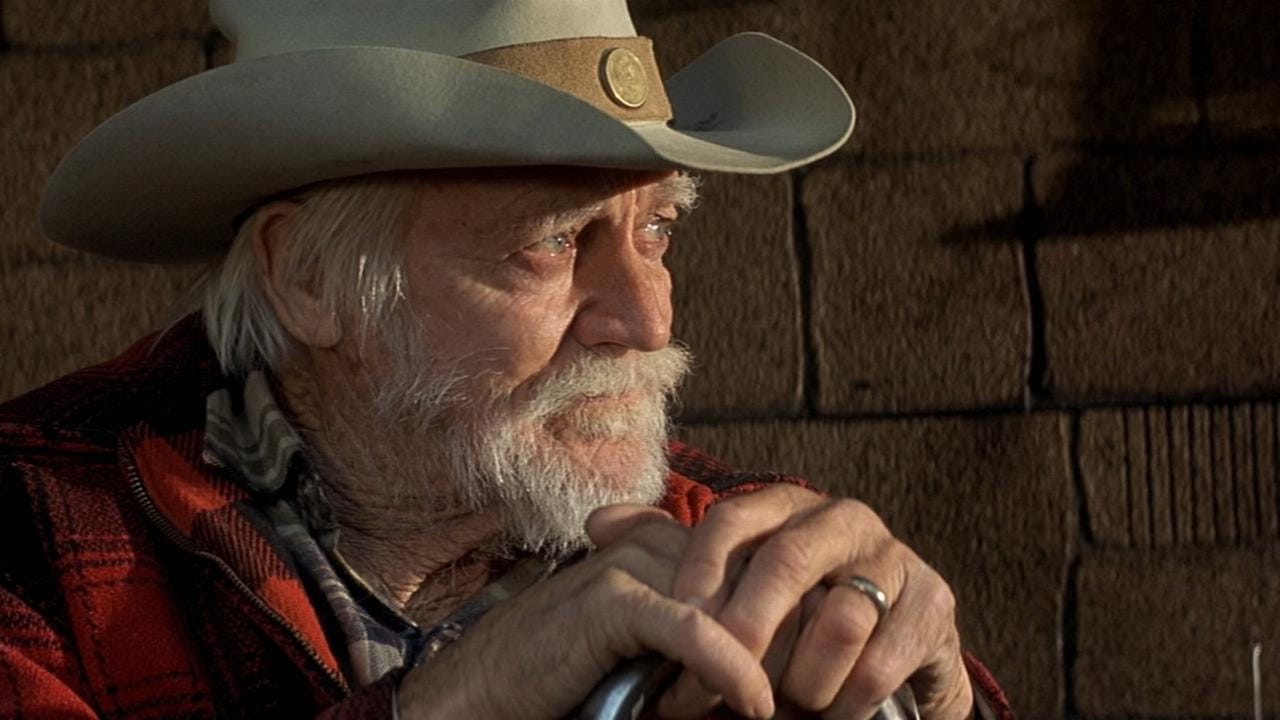'The Straight Story' Review: What Goes Around Comes Around
David Lynch's family-friendly film may be surprising coming from him, but it's a beautiful and touching treatise on aging and dealing with the consequences of time.
Unexpected Family-Friendly Films By Outrageous Auteurs: Inspired by this idea, I've been mulling over which films to include. Then, earlier this week, director David Lynch announced that he had emphysema.
"Ladies and Gentlemen,
Yes, I have emphysema from my many years of smoking. I have to say that I enjoyed smoking very much, and I do love tobacco - the smell of it, lighting cigarettes on fire, smoking them - but there is a price to pay for this enjoyment, and the price for me is emphysema. I have now quit smoking for over two years. Recently I had many tests and the good news is that I am in excellent shape except for emphysema. I am filled with happiness, and I will never retire.
I want you all to know that I really appreciate your concern.
Love,
David"
Naturally, this saddened me. Lynch, now 78, completed Twin Peaks: The Return in 2017, and has kept busy with other artistic pursuits since then. Smoking has always seemed to be a part and parcel of his work, which is not terribly surprising. He grew up as part of a generation that admired smoking and idolized smokers.
Still, the news sparked my own fond remembrance of watching David Lynch's sole family-friendly film, The Straight Story (1999), bookended by the decidedly non-family friendly Lost Highway (1997) and Mulholland Drive (2001). It was part of a decade of his work that included Twin Peaks (1990-1991) which is surely the most subversive series to ever air on broadcast television, intended for a broad audience.
Like Lynch's Blue Velvet (1986) and several of his other films, The Straight Story begins with a shot that initially seems incongruous with the action that follows. In this case, we start with a starry, starry night, which slowly transforms into a bucolic morning, somewhere in Middle America. As the camera pans down to a large farming vehicle, slowly motoring through the empty main street of a small town, wild dogs run free, barking.
The scene changes to a couple of pleasant-looking, if unremarkable houses. Outside one, a woman gets up from her lawn lounger, returning with a bowl of food to munch on while she stretches out in the sun. In the interim, the camera pans by the exterior of the neighboring house, where we hear a loud "thud."
Soon, we learn that the thud-ee is Alvin Straight (Richard Farnsworth), who has fallen in his kitchen and needs help to get up. Reluctantly, he visits the only doctor in town. After a brief examination, the doctor informs him of his diagnosis.
Alvin appears to be in the early stages of emphysema.
That gave me pause. I'd forgotten that diagnosis in the movie. It added a layer of sadness, because I realized that David Lynch knew perfectly well that smoking can cause emphysema and other diseases. And he kept on happily smoking.
At the time of filming, director David Lynch was 53. Actor Richard Farnsworth was 79; the following year, suffering from terminal cancer and in a great deal of pain, he died by his own hand.
Now that I'm aware of all those things, and now that I am in my 60s, watching The Straight Story felt like soaking in an elegy for past time, and coming to terms with the consequences for a lifetime of actions.
In 1994, military veteran and widower Alvin Straight traveled 240 miles on a riding lawn mower from Laurens, Iowa, to Blue River, Wisconsin, in order to visit his ailing brother. The film, written by John Roach and Mary Sweeney, follows the outlines of the true story.
Alvin, after hearing that his estranged brother has suffered a life-threatening stroke, decides he must visit him so as to resolve personal issues that arose between them. Because Alvin suffers from poor eyesight, no longer has a driver's license, and is disinclined to ask anyone else for assistance, he decides to drive his riding lawn mower, towing a trailer loaded with supplies, to make the trip.
Filming along the same route that the real-life Straight took just a few years before, Lynch and his creative team, notably master cinematographer Freddie Francis (Lynch's Dune and Blue Velvet), editor and producer Mary Sweeney, music composer Angelo Badalamenti, costume designer Patricia Norris, and production designer Jack Fisk (aka Sissy Spacek's husband), weave a tale of shimmering beauty and quiet splendor, capturing the lonely roads, freshly-harvested fields, and friendly people, who invariably offer to help, yet are never pushy or meddlesome.
Sissy Spacek, as Alvin's concerned daughter Rose, who is also a smoker, and Everett McGill (Twin Peaks), as a John Deere farm-equipment salesman, are the most familiar faces in the supporting cast, though they blend easily into the background, part of the seamless mosaic that Lynch and his team created.
It's an ineffably gorgeous film, which becomes more affecting with every viewing, all the more so in view of the recent news about David Lynch. It's a film to watch with family and friends. It's a celebration of what was and what will be. [Disney Plus]






